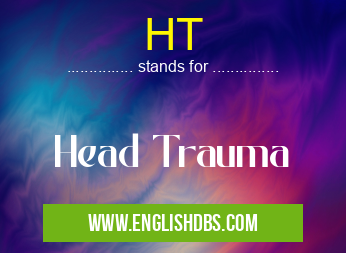What does HT mean in MEDICAL
HT is an abbreviation commonly used in the medical field, standing for Head Trauma. It refers to any injury to the head that results in damage to the brain, skull, or scalp. Head trauma can range in severity from mild concussion to severe traumatic brain injury (TBI).

HT meaning in Medical in Medical
HT mostly used in an acronym Medical in Category Medical that means Head Trauma
Shorthand: HT,
Full Form: Head Trauma
For more information of "Head Trauma", see the section below.
Symptoms of HT
The symptoms of head trauma vary depending on the severity of the injury. Some common symptoms include:
- Headache
- Dizziness
- Nausea and vomiting
- Confusion
- Loss of consciousness
- Memory loss
- Difficulty speaking or understanding speech
- Seizures
- Paralysis or weakness on one side of the body
Causes of HT
Head trauma can be caused by various factors, including:
- Falls
- Motor vehicle accidents
- Sports injuries
- Assaults
- Industrial accidents
Diagnosis of HT
Diagnosing head trauma involves a physical examination, a detailed medical history, and imaging tests such as computed tomography (CT) or magnetic resonance imaging (MRI). These tests help determine the extent and severity of the injury.
Treatment for HT
Treatment for head trauma depends on the severity of the injury. Mild cases may require rest and pain relievers, while more severe cases may require surgery, intensive care, and rehabilitation.
Essential Questions and Answers on Head Trauma in "MEDICAL»MEDICAL"
What is Head Trauma?
Head trauma refers to an injury to the head that can range from mild to severe. It can result from a variety of causes, including accidents, falls, and assaults. Head trauma can affect the brain, skull, and other structures of the head.
What are the symptoms of Head Trauma?
Symptoms of head trauma can vary depending on the severity of the injury. Mild head trauma, also known as a concussion, may cause symptoms such as headache, nausea, vomiting, dizziness, confusion, and memory loss. More severe head trauma can lead to unconsciousness, seizures, difficulty breathing, and paralysis.
How is Head Trauma diagnosed?
Head trauma is diagnosed based on a patient's symptoms, physical examination, and medical history. Imaging tests, such as CT scans and MRI scans, may be ordered to assess the extent of the injury.
What is the treatment for Head Trauma?
Treatment for head trauma depends on the severity of the injury. Mild head trauma typically requires rest and over-the-counter pain medication. More severe head trauma may require hospitalization, surgery, and rehabilitation.
What are the complications of Head Trauma?
Complications of head trauma can include post-concussion syndrome, cognitive impairment, seizures, and paralysis. In severe cases, head trauma can be fatal.
How can I prevent Head Trauma?
There are several steps you can take to prevent head trauma, including:
- Wearing a helmet when participating in activities such as biking, skateboarding, and skiing.
- Avoiding falls by using handrails and being aware of your surroundings.
- Taking precautions to prevent car accidents, such as wearing a seat belt and not driving under the influence of alcohol or drugs.
Final Words: HT, or Head Trauma, is a serious medical condition that requires immediate attention. Early diagnosis and appropriate treatment are crucial for preventing long-term complications and ensuring optimal recovery.
HT also stands for: |
|
| All stands for HT |
